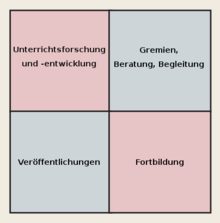Evangelical Institute for Vocational Religious Education
The Evangelical Institute for Vocational Religious Education (EIBOR) is a third-party funded institute founded in 2008 for the research and further development of religious education at vocational schools .
Institute
The institute is attached to the chair for religious education at the Evangelical Theological Faculty of the University of Tübingen and is headed by the chair holder Friedrich Schweitzer . The management of the institute controls the projects of the staff team. An advisory board with representatives from church, business, politics and society accompanies the work.
Focus of work
In the threefold horizon of science, practice and the public, the institute divides its work into four interlinked areas of activity:
1. Classroom research and classroom development (selected projects)
- Value formation
- Effectiveness of interfaith learning
- Ethical education in nursing
- Interreligious and intercultural competence in training for the elementary sector
- Intercultural and interreligious sensitive education in day-care centers
2. Committees, advice, support
The EIBOR participates in various working groups and committees in the educational, scientific and professional context.
3. Publications (selection)
- Friedrich Schweitzer, Golde Wissner, Annette Bohner, Rebecca Nowack, Matthias Gronover, Reinhold Boschki. Youth - Faith - Religion. A representative study on adolescents in religion and ethics classes. Faith - Formation of Values - Interreligiosity, Vol 13 . Münster / New York 2018.
- Reinhold Boschki, Matthias Gronover, Monika Marose, Michael Meyer-Blanck, Hanne Schnabel-Henke, Friedrich Schweitzer (eds.): Person - Personality - Education. Tasks and possibilities of religious instruction in vocational schools. Faith - Formation of Values - Interreligiousness, Volume 11 . Münster 2017.
- Friedrich Schweitzer, Magda Bräuer, Reinhold Boschki (eds.): Interreligious learning through the adoption of perspectives. An empirical study of religious didactic approaches. Faith - Formation of Values - Interreligiosity, Volume 10 . Münster 2017.
- Friedrich Schweitzer, Albert Biesinger (ed.): Culturally and religiously sensitive? Interreligious and intercultural competence in training for the elementary sector. Interreligious and Intercultural Education in Childhood, Volume 5 . Münster 2015.
- EIBOR / KIBOR (ed.): Business ethics and religion. Global players, crafts and vocational schools in conversation. Tübingen 2014.
- Claudia Märkt, Hanne Schnabel-Henke, Friedrich Schweitzer: Bible - something for me? Lesson modules for vocational schools. RU practical - vocational schools . Göttingen 2014.
- Heinrich Merkt, Margrit Schlipf, Friedrich Schweitzer, Albert Biesinger (eds.): Ethical and interreligious competencies in care. Teaching materials for nursing education. Göttingen / Bristol 2014.
- Albert Biesinger, Matthias Gronover, Michael Meyer-Blanck, Andreas Obermann, Joachim Ruopp, Friedrich Schweitzer (eds.): God - Education - Work. Future of Vocational Religion Teaching. Faith - Value Formation - Interreligiosity, Volume 4 . Münster 2013.
- Friedrich Schweitzer, Joachim Ruopp, Georg Wagensommer: Formation of values in religious education. An empirical study in the vocational field. Faith - Formation of Values - Interreligiousness, Volume 2 . Münster 2012.
- Albert Biesinger, Friedrich Schweitzer, Matthias Gronover, Joachim Ruopp (eds.): Integration through religious education. Perspectives between vocational training and religious education. Faith - Formation of Values - Interreligiosity, Volume 1 . Münster 2012.
- Claudia Märkt, Joachim Schmidt, Hanne Schnabel-Henke: Quality development by intensifying the learning time? - New organizational models for religious education in vocational schools. The vocational school, volume 63 (2011) .
- Friedrich Schweitzer: Tasks and perspectives of a job-oriented religious education. Lecture on the occasion of the opening of the EIBOR on January 26, 2009. BRU Magazin, issue 50 (2009) . Pp. 39-43.
4. Training in various formats (selection)
- "Religion in school classes with refugees"
- Ecumenical Forum "Integration through Religious Education"
- Workshop conference New organizational models in the BRU: Learning in long time units - experiences and challenges
- Study day “Happiness - Art of Living - God. Challenges for Religious Education "
- Symposium "Intercultural and Interreligious Competence in Nursing"
- Nationwide Future Congress BRU "God - Education - Work"
- Vocational Education Symposium "Integration - Religion - Vocational Education"
- Congress "School - Values - Religion"
- Study day "Violence Prevention. Vocational schools, bullying and cyberbullying "
Cooperations
The EIBOR is in close cooperation with the Catholic Institute for Vocational Religious Education (KIBOR) . The cooperation extends to both specialist events and joint research projects.
There is also close cooperation with the evangelical sister institute in Bonn (bibor), especially for nationwide events and publications.
Within the University of Tübingen, special reference should be made to the cooperation with the Center for Islamic Theology and Empirical Educational Research (Hector Institute).
financing
The Evangelical Churches and the State of Baden-Württemberg support the work by delegating several offices. The Evangelical Theological Faculty and the University of Tübingen participate by providing rooms and operating resources. Business sponsors complement the financing concept. The institute has also successfully acquired additional third-party funding. Particular mention should be made of the German Research Foundation , the Robert Bosch Foundation , the Ravensburger Verlag Foundation and the Kinderland Baden-Württemberg Foundation, all of which were or are significantly involved in the financing of projects.
Web link
Evangelical Institute for Vocational Religious Education (EIBOR) at the University of Tübingen
